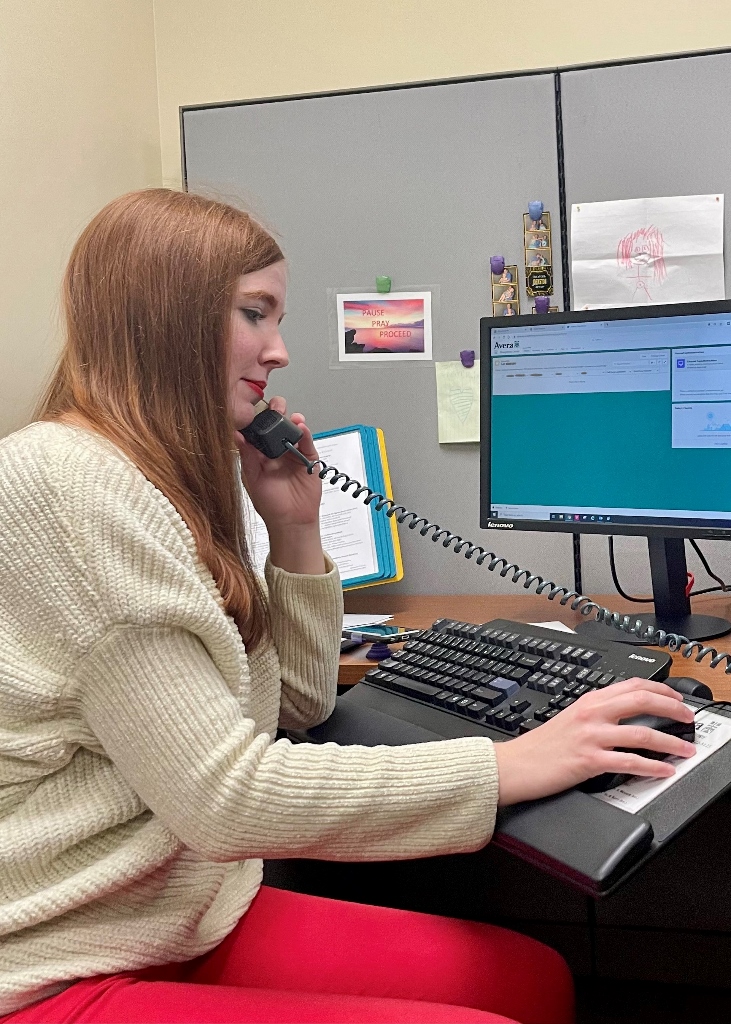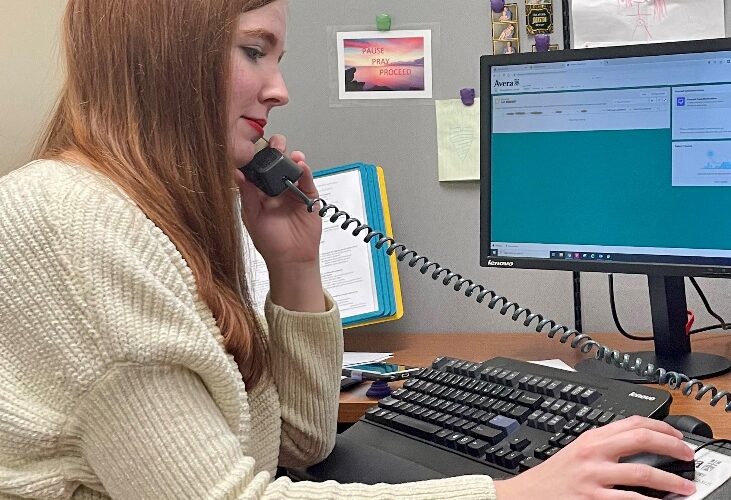Navigators help patients face any issues cancer can create
No two cancer patients are alike, and with a cancer diagnosis come many questions.
That’s why the Avera Cancer Institute has made its Cancer Navigation Center a robust, 24/7 service. Questions can come in the middle of the night or on a Saturday afternoon.
“Our patients don’t have to wait until their next appointment,” said Christina Early, manager of the Avera Cancer Institute navigation center. “They can always count on hearing a real voice and getting answers, no matter when they need it.”
Avera Cancer Institute began navigation services in 2007 with disease-specific navigators for breast, lung and gastrointestinal tract cancers. The navigation center established in 2016 is available to all patients, regardless of the type of cancer or where they get their care.
Avera cancer navigator Erica George, RN, takes calls from patients and family who need answers or help at the Avera Cancer Institute’s navigation center.
The navigation center is part of Avera Cancer Institute’s six regional locations, and it receives calls from across Avera’s footprint and beyond. Its mission is simple: help all whom cancer affects.
“The Avera Cancer Institute is there at pivotal moments in the cancer journey,” said Jamie Arens, director of cancer clinic services. “Our navigation model is patient-centered and unique, since we ensure cancer care 24/7.”
Significant accomplishments in patient service
Oncology-trained registered nurses and master-prepared social workers answer the calls. The elite team’s accomplishments are many, including:
- An average of more than 1,750 calls each month.
- More than 14,000 interventions provided, including education and treatment follow-ups.
- An increase of almost 100 percent in emotional-support calls during the pandemic.
- An average wait-time of only 35 seconds per call.
“A cancer diagnosis can create a whirlwind of emotions and decisions, and we provide support and educate patients in real time,” Early said. “If needed, we can then connect them to the right place.”
The oncology nurse can provide symptom-management education or connect patients to their care teams. Physician-approved symptom-management protocols are in place to help make everything happen more timely, which is what their physician would want.
“Whether we call them or they call us, we’re not just ‘a voice on the phone.’ We have answers that lead to more successful treatment,” she said. “This core component of our care program contributes to better results.”
When navigators catch a symptom in time, they can guide the patient and help them avoid a visit to an emergency room.
“Our navigators coordinate treatment with Avera cancer centers to help avoid admission or readmission,” Arens said. “As one of our tools, it’s helped us rethink how we can best care for patients.”
Evolution of patient services
Navigation professionals not only take calls from patients but also make them. During those first days after a patient receives a diagnosis or starts a treatment, a navigator reaches out to check in and address concerns. The navigator calls on behalf of the patient’s physician and documents the call in the patient’s medical record so the physician knows exactly how the patient is doing.
“We meet patients where they are and make sure they’re aware of what will happen next,” Early said. “Not knowing if something is a ‘big enough deal’ to call about can lead patients to not call. Our outgoing calls help meet their needs and teach them how navigation resources are there for them.”
Calls in both directions make sure patient, physician and care team are always on the same page. Having cancer resources this easily available is as much about compassion as it is about ensuring quality cancer care.
Supporting other health professionals
Every member of a cancer care team benefits from navigation.
“Our navigation services ensure the wide, complex nature of oncology is not on the shoulders of a single physician or nurse,” said Kris Gaster, Avera vice president of outpatient cancer clinics. “It’s a proactive system that ensures quality and reduces stress. We decrease the time a patient might wait to get answers when they’re worried.”
The program serves all who call 605-322-3211 or 888-422-1410 or who visit Avera’s Prairie Center in person during business hours. Avera cancer navigators serve all patients facing the disease – not just Avera patients. They also serve family members, caregivers and loved ones.
Learn more at Avera.org/cancer, or email [email protected].








